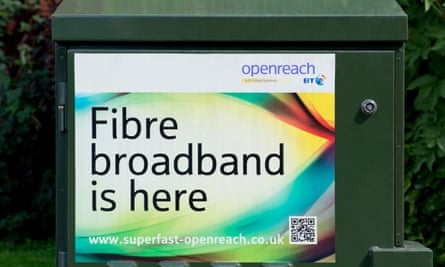BT has received £105m as an upfront prepayment for the sale of surplus copper cables from its old network which it is replacing in a £15bn rollout of high-speed full-fibre broadband to 25m homes in one of the UK’s biggest private national infrastructure programmes.
The telecoms company has struck a deal with a recycling company and received the sum after entering into a forward agreement to sell copper granules created from surplus copper cables that are being replaced by its new full-fibre network. The £105m transaction is the first of its kind.
BT, led by the chief executive, Allison Kirkby, has so far reached more than 15m premises with its full-fibre broadband, and aims to roll it out to about 25m properties by the end of 2026 after passing its peak capital expenditure in the last financial year.
Clive Selley, the chief executive of Openreach, said this month he was confident that BT could reach 30m premises by the end of 2030, given the right regulatory and investment environment.
The huge programme has led to BT, through its Openreach division, recovering 3,300 tonnes of copper in the year to 31 March 2024. It has struck a deal with a bank and global recycler EMR to support the extraction and recycling of copper cable from its network until 2028.
The company said that while its copper extraction programme continued and was being seen as a commercial revenue stream for BT Group, it was too early to provide any financial outlook on the copper value.

Openreach said: “As we look to recover and reuse scarce resources like copper in line with our commitment to sustainability, we estimate that as we replace old copper networks with fibre, we’ll be able to recover up to 200,000 tonnes of copper through the 2030s – in line with customer migrations.”
Copper is a valuable material that is widely used in datacentres as well as in electrical equipment such as wiring, wind turbines and motors.
At current market prices, 200,000 tonnes of copper could be worth about £1.5bn.
A 2022 study by S&P Global, the rating agency, said copper was essential to all energy transition plans; substitution and recycling will not be enough to meet the demands of electric vehicles, power infrastructure, and renewable generation. It estimated that copper demand is projected to grow from 25m metric tonnes today to about 50m by 2035.
after newsletter promotion
This year the copper price has been held back by falling demand from China. In a recent note, Goldman Sachs analysts reduced their 2025 target for copper to $10,100 a tonne against a previous expectation of $15,000 due to a drop in demand from China. However, earlier in September, copper rose to a two-month high bolstered by the Federal Reserve’s half-point cut to US interest rates.
Scrap metal, including copper, is already a target for thieves and Openreach has acted to prevent thieves stealing the copper cables to sell for scrap value.
Last year, when criminals struck in Bleasby, Nottinghamshire, they took three-quarters of a mile of Openreach cables, which all needed replacing.
Openreach is using a wide range of anti-theft measures including coating miles of underground cables with a synthetic DNA and UV tracer, called SelectaDNA.
This is widely used across the Openreach network and the tracer easily transfers to hands and clothing, and recently helped secure three convictions in Lincolnshire, including one individual handed a 16-month prison sentence for attempted theft.
Source: theguardian.com


